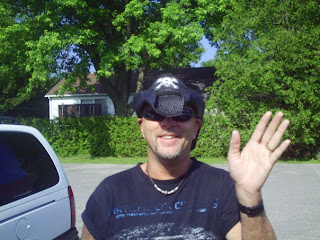
Below is an open letter to recording artsist from Courtney Love...this is not recent however still very valid and I thought I would share it with you.
Courtney Love's Letter to Recording Artists - ARTIST RIGHTS AND RECORD COMPANIES
Dear Fellow Recording Artists,
I'm writing to ask you to join the chorus of recording artists who want us all to get a fair deal from the record companies. R.E.M., the Dixie Chicks, U2, Alanis Morrissette, Bush, Prince and Q-Tip have called me with their support and we need your participation as well.
There are 3 basic facts to all recording artists should know:
1. No one has ever represented the rights and interests of recording artists AS A GROUP in negotiations with record companies.
2. Recording artists don't have access to quality health care and pension plans like the ones made available to actors and athletes through their unions.
3. Recording artists are paid royalties that represent a tiny fraction of the money their work earns.
As I was working with my manager and my new attorneys on my lawsuit with the Universal Music Group, we realized that the most unfair clauses in my contract applied to ALL recording artists. Most importantly, no one was representing artists in an attempt to change the system.
Recording artists need to form a new organization that will represent their interests in Washington and negotiate fair contract terms with record companies.
Here's what you should know:
THERE IS NO ONE WHO REPRESENTS RECORDING ARTISTS
Recording artists don't have a single union that looks out for their interests.
AFTRA (American Federation of Television and Radio Artists) has a contract with major labels for vocalists and the AFM (American Federation of Musicians) has a contract for non-singing musicians and session players. If you're in a band, your singer is represented by a different union (AFTRA) than the rest of your group (who are represented by the AFM). AFTRA negotiates contracts for TV and Radio performers. They don't pay very much attention to the recording business; it's not their priority. The AFM acts like band members are sidemen and session players because that's mostly who the union represents.Record companies like this system because neither union represents all artists.
AFTRA and AFM only negotiate session fees and other minor issues for the singers or the "sidemen." Who looks after our interests in Washington? Until very recently, Congress believed that the RIAA spoke for recording artists. The RIAA (Recording Industry Association of America) is a trade group that is paid for by record companies to represent their interests. The Napster hearings last summer and a few other issues have let Washington know that NO ONE speaks for recording artists right now. We have their attention and must act quickly to make sure artists have a voice.
RECORDING ARTISTS DON'T HAVE A SAFETY NET
Compare yourself to actors and baseball players. Like the music business, the film and the sports industries generate billions of dollars in income each year, but those industries offer far better benefits to the men and women who create their wealth.
The Screen Actors Guild offers a fantastic health care plan to its members.
That health plan is paid for by the contracts that SAG has negotiated with film studios.
The baseball player's union has negotiated a pension plan that ensures that NO major league player ever finds himself without an income.
Why shouldn't recording artists get the same benefits?
RECORDING ARTISTS DON'T GET PAID Record companies have a 5% success rate. That means that 5% of all records released by major labels go gold or platinum. How do record companies get away with a 95% failure rate that would be totally unacceptable in any other business?
Record companies keep almost all the profits. Recording artists get paid a tiny fraction of the money earned by their music. That allows record executives to be incredibly sloppy in running their companies and still create enormous amounts of cash for the corporations that own them.
The royalty rates granted in every recording contract are very low to start with and then companies charge back every conceivable cost to an artist's royalty account. Artists pay for recording costs, video production costs, tour support, radio promotion, sales and marketing costs, packaging costs and any other cost the record company can subtract from their royalties.
Record companies also reduce royalties by "forgetting" to report sales figure, miscalculating royalties and by preventing artists from auditing record company books.
Recording contracts are unfair and a single artist negotiating an individual deal doesn't have the leverage to change the system.
Artists will finally get paid what they deserve when they band together and force the recording industry to negotiate with them AS A GROUP.
Thousands of successful artists who sold hundreds of millions of records and generated billions of dollars in profits for record companies find themselves broke and forgotten by the industry they made wealthy.
Here a just a few examples of what we're talking about:
Multiplatinum artists like TLC ("Ain't 2 Proud 2 Beg," "Waterfalls" and "No
Scrubs") and Toni Braxton ("Unbreak My Heart" and "Breathe Again") have been
forced to declare bankruptcy because their recording contracts didn't pay them
enough to survive.
Corrupt recording agreements forced the heirs of Jimi Hendrix ("Purple Haze,"
"All Along the Watchtower" and "Stone Free") to work menial jobs while his
catalog generated millions of dollars each year for Universal Music.
Florence Ballard from the Supremes ("Where Did Our Love Go," "Stop in the Name
of Love" and "You Keep Me Hangin' On" are just 3 of the 10 #1 hits she sang on)
was on welfare when she died.
Collective Soul earned almost no money from "Shine," one of the biggest
alternative rock hits of the 90s when Atlantic paid almost all of their
royalties to an outside production company.
Merle Haggard ("I Threw Away the Rose," "Sing Me Back Home" and "Today I Started
Loving You Again") enjoyed a string of 37 top-ten country singles (including 23
#1 hits) in the 60s and 70s. Yet he never received a record royalty check until
last year when he released an album on the indie punk-rock label Epitaph.
Think of it this way: recording artists are often the writers, directors and
producers of their own records. They write the songs, choose the producers and
engineers who record their music, hire and oversee the photographers and
designers who create their CD artwork and oversee all parts of video production,
from concept to director to final edit. Record companies advance money for
recording costs and provide limited marketing services for the music that
artists conceive and create. In exchange, they keep almost all of the money and
100% of the copyrights.
Even the most successful recording artists in history (The Beatles, The Eagles,
Nirvana, Eminem) have been paid a fraction of the money they deserved from sales
of their records. This is a very big and very important project and we're in the
early days.
Here's what we're looking for:
1. Artists who are willing to speak to the media to publicly lend their support
to the idea that recording artists need an organization that represents our
interests in Washington and with the record companies. We also would like you
tell your managers and attorneys that you support this cause and that you expect
them, as your representatives and employees to do the same.
2. Anyone who can tell us specific stories about how artists have been ripped
off by record companies like the ones I told above.
We're going to have to educate the public and the media and Congress and the
only way we'll do that is by giving them examples they can relate to. NOW is the
time for action. Artists like Garbage and N*SYNC have have joined me in
questioning bad contracts and have also gone to court to change the system.
Record companies have merged and re-merged to the point where they can no longer
relate to their artists. Digital distribution will change the music industry
forever; artists must make sure they finally get their fair share of the money
their music earns. We need to come together quickly and present a united front
to the industry.
Your managers and attorneys will probably tell you not to rock the boat and not
to risk your "relationship" with your record company by taking a stand. Most
attorneys and managers are conflicted. Almost all entertainment law firms
represent both artists and record companies. Lawyers can't take a stand against
record companies because that's where they get most of their business. Even the
best managers often have business relationships with labels and depend on record
companies to refer new clients.
Think about Eddie Vedder and Pearl Jam's stand against TicketMaster. Everyone
knew he was right and yet no other artist took a public stand against a company
that we all knew was hurting our business because our managers and attorneys
told us it would be a bad idea.
Attorneys and managers are your employees. Make sure they know how you feel and
that you want them to publicly support the idea that the terms of recording
contracts are unfair and cover too long a time period. You also want them to
support an organization that will negotiate health and pension benefits for all
recording artists.
Artists have all the power. They create the music that makes the money that
funds the business. No one has ever harnessed that power for artists' collective
good. And remember something equally important: Actors had to fight to end the
studio system that forced actors to work for one employer and baseball players
had to strike to end the reserve clause that tied a player to one team for his
entire career. Even though "experts" predicted economic disaster once actors and
athletes gained their freedom, both the film business and baseball have enjoyed
their greatest financial success once their talent was given its freedom.
Join us now in taking a public stand. Your name will help get the attention that
artists rights deserve. If you're willing to speak to the media or testify
before Congress, you can help make our goals a reality.
Do it for yourself, for your children and do it for the artists who inspired you
to make music in the first place.
Email us at:
Artists@theredceiling.comGive us your stories and your support. Tell us we can add your name to the list
of artists who support this organization. And let us know how to contact you
directly as we move forward on this project.
If you're interested in learning more about my case with Universal, visit my
manager's website: http://www.theredceiling.com.
You can download a copy of our cross-complaint and press releases that describe
the issues we're taking to court. Thanks in advance for your support.
Best regards,
Courtney Love

![Reblog this post [with Zemanta]](http://img.zemanta.com/reblog_e.png?x-id=6667862a-cab5-49e6-9796-c251e62011c6)

![Reblog this post [with Zemanta]](http://img.zemanta.com/reblog_e.png?x-id=917d9c80-ebda-4081-8175-3383393adf77)

![Reblog this post [with Zemanta]](http://img.zemanta.com/reblog_e.png?x-id=d091fd96-e87f-480b-a66f-91293d0e3244)

![Reblog this post [with Zemanta]](http://img.zemanta.com/reblog_e.png?x-id=10cc9d1d-c8f3-4d66-8664-4c065fb74dfa)


![Reblog this post [with Zemanta]](http://img.zemanta.com/reblog_e.png?x-id=b6283aa9-de4e-431e-9247-efd6f3cf0340)

![Reblog this post [with Zemanta]](http://img.zemanta.com/reblog_e.png?x-id=0676b53d-5aac-40bb-8fbe-4342c034aec6)






